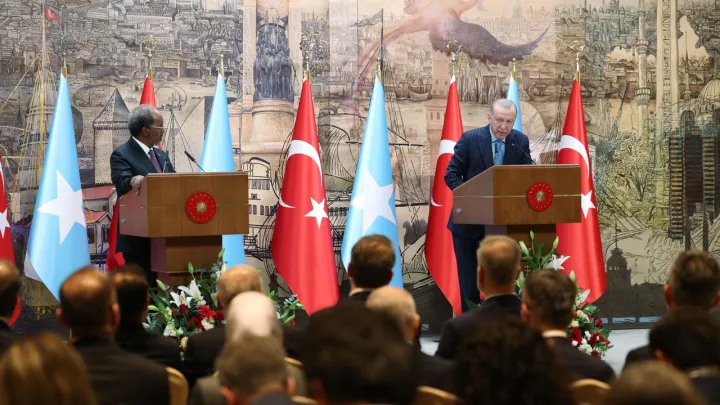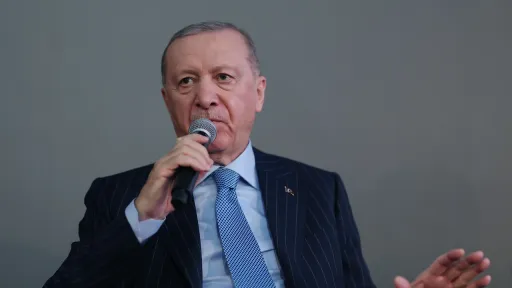Jose Manuel Moller, the vice-chair of the UN Advisory Board of Eminent Persons on Zero Waste, has described Türkiye's stand on the issue as "inspiring."
Speaking to Anadolu Agency, Moller, who is also the CEO and founder of Algramo, a Chilean start-up revolutionising reusable packaging, praised Türkiye for initiating the project.
Türkiye is "a country that is making an effort," and "it is leading the way in terms of showing it is possible and that is possible for everyone," he added.
The Zero Waste project, spearheaded in Türkiye by First Lady Emine Erdogan in 2017, was jointly developed on an international level last year by Turkish President Recep Tayyip Erdogan and UN Secretary-General Antonio Guterres.
Last week, on the sidelines of the 78th UN General Assembly in New York, Erdogan signed a Global Zero Waste goodwill declaration.
A signing ceremony, led by the president's wife, took place at the Turkish House diplomatic hub as part of the "Path To Global Zero Waste Movement" event.
President Erdogan became the first zero waste volunteer by being the inaugural signatory of the Global Zero Waste Goodwill Declaration, made available for individual participation on its website, in support of the Global Zero Waste Movement led by First Lady Emine Erdogan.
According to the initiative's website, the declaration recognises the importance of efficient resource use, waste reduction, recycling, and other steps to align with the Paris Agreement and 2030 Sustainable Development goals.
"We pledge to promote the zero waste approach worldwide and share best practices for its wider recognition and application," it added. The declaration of goodwill, initially signed by the First Lady and the UN chief, has since been endorsed by the spouses of nearly 30 heads of state, including ones from France, South Korea, Paraguay, and Cuba.
Last year, the UN General Assembly formally recognised the importance of zero-waste initiatives and proclaimed March 30 as the International Day of Zero Waste, to be observed annually beginning in 2023.
This year, in March, the UN Secretary-General Guterres thanked the Turkish first lady for agreeing to chair the Advisory Board of Eminent Persons on Zero Waste. The board, which started to operate with the aim of disseminating best practices and success stories in the field of zero waste and raising awareness worldwide, held its first meeting online in July.
The first face-to-face meeting of the Board members is planned to be held in Istanbul on November 1.
'It was an honor'
Moller told Anadolu that it was a surprise for him to be chosen as part of the board.
"First of all, it was a huge surprise because this is something that didn't exist before and it's something that you don't apply, so I wasn't expecting anything from anyone," he said.
"It was an honor," he added. "So, we're leading this group, which is an interesting mix between governments and recyclers." He said that the board is "a mix of backgrounds from different regions" and "backgrounds."
"I think it gave us also the right timing. Three years is enough to produce something concrete," he explained.
Moller explained that his main aim "was to, hopefully, focus on results," and not to have more reports," as "there are tons of reports around sustainability."
He said he aimed to "how we could avoid the production of waste, more than how we handle waste."
"How we manage waste, how we avoid the creation from the beginning. The board had already the first session, which was an introductory one," he said.
"We will have one in-person actually in Istanbul at the end of October."
Algramo project
Moller, vice chair of the advisory board, launched the Algramo project in 2013. Thanks to the system, consumers can come to vending machines located at certain points and fill products such as detergent and cooking oil into the packages they bring with them.
In this way, consumers are saved from overpaying for the package, preventing more waste.
Moller said that his idea of Algramo was created while he was studying economics in Santiago, Chile, and emphasized that his experiences in the student house had a significant impact on this.
Explaining that he was responsible for cooking and shopping in the house where he lived with his three friends during his university years, Moller said that he comes from a large family where they used to buy things in large amounts to save money.
One day, he calculated that although they bought fewer products in the student house, they paid almost 60 percent more because they bought them piece by piece. Describing this situation as a "poverty tax," Moller realised that the cost of packaging was behind this, resulting in him creating the sustainable purchasing model he implemented at Algramo.
























